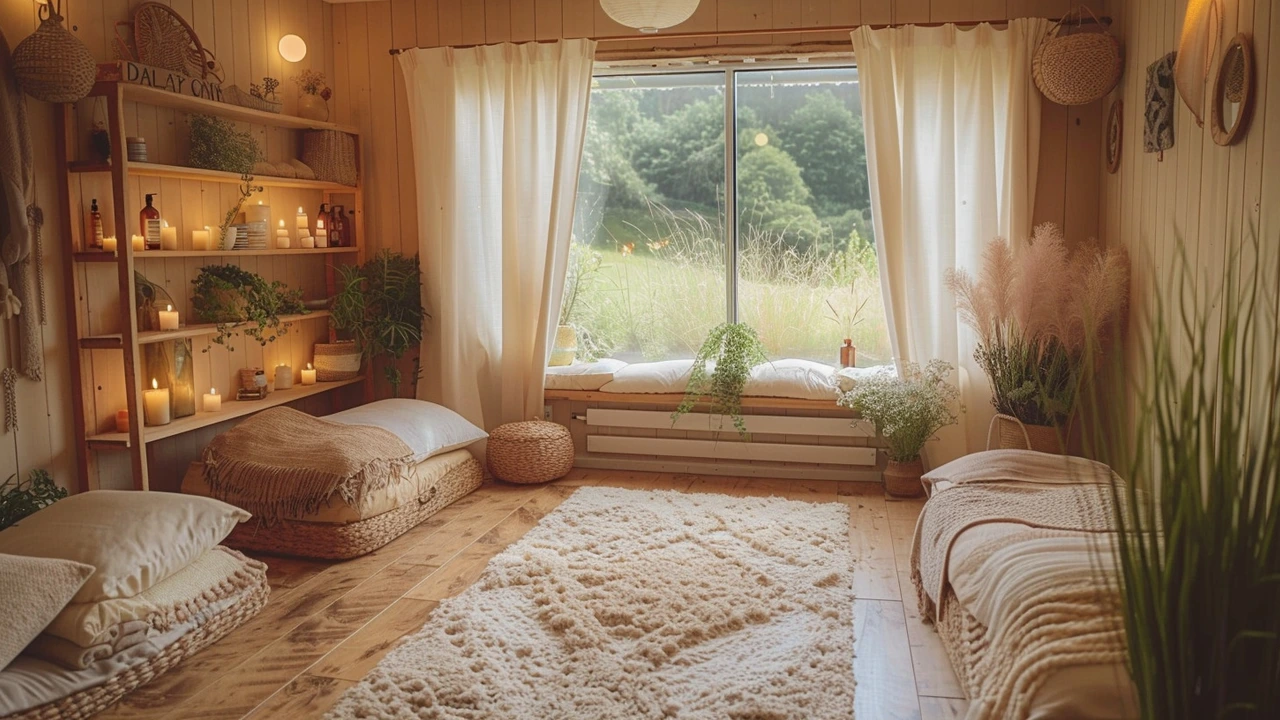Reiki Massage Benefits: Healing Energy for Mind, Body, and Spirit

- Jun, 4 2024
- 0 Comments
- Tabitha Moorehead
Discovering the paths to well-being can often lead to surprising and enriching experiences. One such path is Reiki massage, an ancient technique that is making waves in modern holistic therapy. But what exactly is Reiki Massage?
In simple terms, Reiki is a form of energy healing that originated in Japan. The word 'Reiki' comes from the Japanese words 'rei' (universal) and 'ki' (life energy). Practitioners of Reiki believe that we are surrounded by this universal life energy, and it’s this energy that flows through all living things.
Imagine feeling a gentle warm glow through your body, like a soothing ray of sunshine. That's what Reiki aims to achieve, by channeling positive energy into your body to balance your own life force. It works on multiple levels, not just the physical but also the emotional, mental, and spiritual.
The benefits of this practice are as vast as they are varied. Many people report feeling more relaxed and less stressed after sessions. Others notice an improvement in their mental clarity and emotional stability. The healing energies can also promote better sleep and reduce symptoms of anxiety and depression.
If you're curious about integrating Reiki into your daily routine, there are numerous ways to start. From regular Reiki sessions with a certified practitioner to simple self-practice techniques, there is something suited for everyone. It's a beautiful way to take a moment to center yourself, and it can lead to significant improvements in overall wellness.
What is Reiki Massage?
Reiki massage is a beautiful fusion of ancient Japanese energy healing techniques and modern massage practices. The term 'Reiki' itself is derived from two Japanese words: 'rei,' meaning universal, and 'ki,' meaning life energy. The practice of Reiki aims to channel this universal life energy into the recipient to promote healing and balance in the mind, body, and spirit.
The origins of Reiki can be traced back to the early 20th century when Dr. Mikao Usui, a Japanese Buddhist, developed the technique after a profound spiritual experience. He founded the Usui System of Reiki Healing, emphasizing the harnessing of natural energy to facilitate healing. Reiki practitioners believe that this life energy flows through all living things and that its free flow is essential for good health. Any blockage in this energy can lead to physical, mental, or emotional imbalances.
During a Reiki massage session, the practitioner uses a series of hand positions either directly on or just above the client's body. These positions correspond to various energy centers, commonly known as chakras. The practitioner focuses on channeling positive energy to these areas, allowing the client's own life force to be balanced and rejuvenated. The client typically lies on a massage table, fully clothed, in a peaceful, calming environment.
One key philosophy behind Reiki is its simplicity; anyone can learn and practice it. This accessibility makes it a popular choice for those seeking an alternative or complementary therapy. Reiki does not involve the use of any tools or instruments, relying solely on the practitioner's hands and intention to channel energy for healing. This practice is gentle and non-invasive, making it suitable for people of all ages and physical conditions.
While the scientific community is still exploring the mechanisms behind Reiki's effectiveness, countless individuals worldwide swear by its benefits. Reiki massage is said to foster deep relaxation, reduce stress, and promote overall well-being. Some people also report experiencing emotional releases and a greater sense of connection to themselves and the world around them. Studies have shown that Reiki can help enhance the body's natural healing processes, providing support for those dealing with chronic conditions, pain, and anxiety.
"Reiki is a form of therapy that uses simple hands-on, no-touch, and visualization techniques, with the goal of improving the flow of life energy in a person" — National Center for Complementary and Integrative Health
Reiki massage's appeal lies in its holistic approach, addressing the interconnectedness of mind, body, and spirit. It's not just about alleviating symptoms; it's about fostering an environment where true healing can occur. The gentle, nurturing nature of Reiki massage often makes it a deeply personal and transformative experience. For many, it offers a moment of pause, a chance to reconnect with their inner selves amidst the chaos of daily life.

How Reiki Works
Reiki works on the principle of channeling energy from the practitioner to the patient, aiming to balance and harmonize the body's energies. The primary concept is that there is a universal life force energy, often referred to as "ki" in Japan or "chi" in China, that flows through all living things. When life force energy is low or disrupted, people are more likely to get sick or feel stressed; when it is high, one is more capable of being happy and healthy.
A typical Reiki session involves the patient lying down in a comfortable, tranquil setting while the practitioner gently places their hands on or just above specific points on the body. These points, often associated with energy centers known as chakras, are said to be pathways where energy flows. By placing their hands on these areas, the practitioner acts as a conduit for the life force energy, allowing it to flow into the patient's body.
During a session, you might feel warmth or tingling in the areas being touched. Many people describe a sensation of deep relaxation and peace, sometimes even falling asleep during the process. The session usually lasts between 45 to 90 minutes, and while a single session can be beneficial, multiple sessions can help create lasting change.
It is worth noting that Reiki is not tied to any specific religion or spiritual practice, making it accessible and open to people from all walks of life. The belief is that the body knows exactly where the healing energy is needed, and it will be drawn to those areas almost magnetically. Furthermore, Reiki practitioners are trained to clear and balance their own energies before working with others, ensuring a pure and uninterrupted flow of energy.
The effectiveness of Reiki has been supported by various studies. According to an article published in the Journal of Evidence-Based Complementary & Alternative Medicine, Reiki can help in reducing pain and anxiety, and it can improve overall quality of life. Dr. Ann Baldwin, a scientist from the University of Arizona, conducted a study which found, "Reiki proved to be an effective means of reducing stress, improving mood, and providing relaxation for participants."
For those interested in experiencing this beautiful form of energy healing, it is essential to find a certified and experienced practitioner. Many Reiki associations require practitioners to undergo rigorous training and adhere to strict ethical guidelines. Whether you are seeking help for physical ailment, emotional issues, or simply wish to enhance your overall well-being, Reiki offers a gentle, yet powerful means of support.

Benefits of Reiki
Reiki massage has gained popularity as a holistic therapy, and for good reason. One of the primary benefits of Reiki is its ability to promote deep relaxation. Through gentle touch, Reiki practitioners channel energy into the body, helping to reduce stress and anxiety. Imagine coming home after a long day and relaxing with a feeling of complete tranquility — that’s what Reiki can offer.
In addition to promoting relaxation, Reiki is also known for boosting mood and emotional well-being. Those who regularly receive Reiki treatments often report feeling more balanced and emotionally stable. This can be especially beneficial for individuals dealing with depression or anxiety. It’s like having a soothing balm for the mind and soul.
Reiki can also help manage pain. Whether you're dealing with chronic pain or recovering from an injury, Reiki can provide relief. Studies have indicated that Reiki can reduce pain levels and improve the quality of life for people with chronic conditions. For instance, research published in the Journal of Evidence-Based Complementary & Alternative Medicine found that Reiki was effective in reducing persistent pain and improving mood among patients.
"Reiki is a healing modality that promotes physical, emotional, and spiritual well-being. It is a complementary therapy that can provide tremendous benefits when incorporated into a holistic treatment plan," says Dr. Ann Baldwin, a renowned researcher in energy healing.
Additionally, Reiki has a positive impact on sleep. Many individuals find that they sleep more deeply and wake up feeling refreshed after a Reiki session. Better sleep is essential for maintaining overall health and well-being, and Reiki can be a gentle yet effective way to improve your sleep patterns.
Beyond the personal benefits, Reiki also promotes a deeper connection between the mind, body, and spirit. It encourages a holistic view of health and well-being, making it a valuable practice for those looking to cultivate a balanced life. This connection can lead to increased self-awareness and a greater understanding of one's own needs and desires.
In essence, Reiki offers a multitude of benefits that contribute to overall health. Whether you’re seeking stress relief, emotional balance, pain management, or better sleep, Reiki can be a powerful addition to your wellness routine. With its focus on holistic healing, Reiki provides nourishment for the mind, body, and spirit, helping you to find harmony and peace in your everyday life.

Integrating Reiki into Daily Life
Embracing Reiki as part of your daily routine can be a transformative journey. Each day presents new opportunities to harness the healing energy of Reiki and infuse it into your actions. One of the simplest ways to start is by setting aside a few minutes in the morning or evening for self-practice. This practice doesn't require any specialized equipment, just a quiet space where you can focus and connect with your inner self.
Begin by sitting comfortably and closing your eyes. Place your hands on different parts of your body, such as your head, heart, and stomach. Focus on your breath, inhaling deeply and exhaling slowly, allowing the energy to flow through your hands into your body. Visualize a warm, glowing light radiating from your hands, bringing comfort and healing. This practice, often referred to as self-Reiki, can help center your mind and body, preparing you for the day ahead or aiding in relaxation before bedtime.
Aside from dedicated self-practice, infusing Reiki into your daily activities can be equally beneficial. For instance, you can use Reiki while cooking by simply setting an intention for healing and love as you prepare your meals. Similarly, you might choose to practice Reiki before starting work, setting a positive tone for your day. Engaging with your pets, such as a playful session with your Golden Retriever Barkley, can also be a wonderful occasion to share the calming energy of Reiki.
As Reiki Master Mikao Usui once said, "Just for today, do not worry. Just for today, do not anger." Keeping this principle in mind, use Reiki as a tool to cultivate a more mindful and serene approach to life.
If you're interested in deepening your practice, consider attending regular sessions with a certified Reiki practitioner. They can help you fine-tune your technique and provide guidance tailored to your unique needs. Connecting with a community of like-minded individuals or joining Reiki workshops can also enhance your experience, offering new insights and support.
For those looking to expand their knowledge, books and online resources can be invaluable tools. Popular titles like "The Reiki Manual" by Penelope Quest and Kathy Roberts offer step-by-step guides for both beginners and seasoned practitioners. Moreover, numerous online courses provide structured learning, complete with demonstrations and interactive sessions.
Integrating Reiki into your daily life isn't an overnight process, but rather a journey of continuous learning and self-discovery. By incorporating even small moments of mindfulness and energy healing into your routine, you can enjoy the profound benefits of this ancient practice. Whether through self-reiki, professional sessions, or simply setting healing intentions, the essence of Reiki can become a cherished aspect of your daily wellness routine.